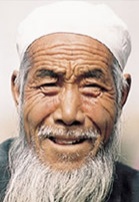 The Hui are the largest and most widespread of China’s Muslim nationalities. |
With over ten million Hui in China, it is astonishing that there are no known Christians among this people group. In fact, over ninety percent of Hui are Muslim and because of this Islam in China is often known as “the Hui religion.” The Hui are the largest and most widespread of China’s Muslim nationalities and their influence in the northwest region of China has led the area to be regarded as “Muslim territory.”
Unlike other Chinese Muslim groups, the Hui do not have their own language; instead they speak local dialects mixed with Arabic and Persian words. The Hui have adjusted to their Chinese society so much so that they are often indistinguishable from the Han Chinese. The Hui are less strict in their Muslim faith and in following Muslim dietary rules than other Muslims worldwide. This has caused Muslims from other countries to question their commitment to Islam.
The Hui are descendants of Muslim traders, soldiers and officials who settled and married local Han women. Today the Hui are still known for their trading skills. They also make their living growing wheat and rice, raising cattle and working in factories and shops.
Since the 1949 Socialist changes in China, the Hui have outlawed early marriages, arranged marriages and polygamy. Women have the same divorce and inheritance rights as men; however, women are not allowed to marry non-Hui men (whereas Hui men are allowed to marry non-Hui women). Today, the Chinese government allows some flexibility for the Hui by allowing them to bury their dead and by exempting them from some aspects of the controlled birth program.
Due to the possibility of persecution, Chinese Muslims are reluctant to become Christians. Christian broadcasts and literature are available to the Hui. Pray that God would send workers to share the Gospel with the Hui, that he would raise up Christians among this people group and that he would do a mighty work among the Hui.
For more information on the Hui of China, visit:
www.chinagate.com.cn/english/1251.htm
www.china.org.cn/e-groups/shaoshu/shao-hui.htm
http://archives.tconline.org/news/lastfrontier/archive/Hui.html
easia.imb.org/peopleplaces/upg/hui.htm
www.ksafe.com/profiles/p_code/1033.html
www.paulnoll.com/China/Minorities/min-Hui.html
(Information compiled from www.joshuaproject.net/)
(Note: The website links above are intended to provide you with more information about this people group. Some of the links are to groups that are not religious in nature but who provide information and background that may be helpful in researching this people group. The content of each of the websites linked to is the sole responsibility of the linked-to organization. Views expressed on these websites do not necessarily reflect the opinions and beliefs of the staff or writers of Lausanne World Pulse or those of the Lausanne Committee for World Evangelization, Institute of Strategic Evangelism, Evangelism and Missions Information Service or Intercultural Studies Department.)

